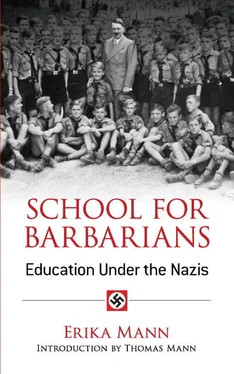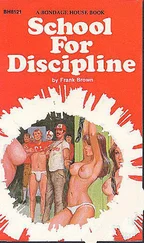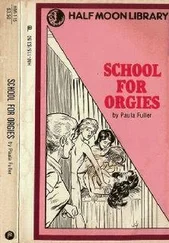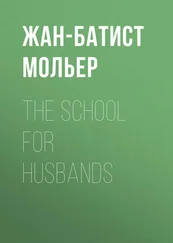The preface to a grammar! Doesn’t it sound more like one of Hitler’s “cultural speeches”? And the examples in the book carry it farther:
“Example 52. Horror tales from foreign countries affirm that after the National Socialist revolution Jews were assassinated in Germany; that their property was taken from them, that they were spat upon, shot down, thrown into prison, their garments torn from their bodies, and left to starve in concentration camps.
“Example 53. (On the prefix ‘un-,’ corresponding to the English ‘in-’.) If the German people remain unified they will be invincible, incomparable, inimitable, indomitable….”
If the manner in which the German people sing their own praise seems more innocuous than invincible, that must be due to the fact that it is the only way in which the “mother tongue” can be rooted deeply in the German view of the world.
In the old days, the grammars used absurd sentences to teach the rules. You might get: “The penknife of my grandfather is nice,” and be asked to write the plural of subject and predicate, being careful not to pluralize the grandfather too. But when you have: “The bombing plane of my fatherland brings destruction,” you have only to think of the content. You’ll get the idea! “The bombing planes of my fatherland bring destruction!”
The Readers deal almost exclusively with race, ancestors, roots in a common soil, heroism, the mystery of the German mission, and the German soul. The German Romanticists, properly expurgated, are in, but there is a general feeling of apology for them. The Nazi conscience is not quite clear here. The N. S. Bildungswesen (Nazi Educational World) says, on the occasion of a new edition of Herder, Grimm, Claudius, etc.: “There were no National Socialists before Adolf Hitler. But before him there were human beings, poets, scientists, and prophets among our people, who became the guardians and awakeners of German essence, and so helped to prepare the raw material out of which Adolf Hitler was able to make his movement and a new Reich.”
The German poets of the past are misused as awakeners of Nazi material. Herder, Grimm, and Claudius are innocent; aside from that, they are thrown in with writers whose names will be forgotten in Germany before they are known outside it, names like H. Fr. Blunck, Maria Kahle, H. Hanselmann (who, according to the N.S. Educator, has written, in Jakobli, a “Novel about Jacob” in two volumes, “the best novel of development” of the present age). Maria Kahle has a lot to say, particularly in the Readers of western Germany, probably because she has a fortunate way of expressing the Nazi demand for “broadening the territory of German life.” She writes:
Unser Haus ist zerstört, unsre Scholle entweiht,
Dock im Heimwehnot und in Knechtschaftsleid,
Seit tausend Jahren singt Ostseewind,
Sudetenwind, Kar pathenwind,
Von Ostlands deutscher Herrlichkeit.
Our house is destroyed and our hearth brought low,
But, homesick or enslaved, we know
How for a thousand years the Baltic wind,
The Sudeten wind, the Carpathian wind
Sang German glory as eastward they blow.
She is even clearer in prose. She writes in an essay on “Germans Outside the Boundaries”:
“Before the War we believed that the boundaries of the German people began and ended where they were mapped out as the German State. Today we are aware that the unity and growth of a people is not dependent on its geographical borders. A German can be the citizen of a foreign state and yet, through his blood and his race and his essential manner and speech, he belongs to us.”
Maria Kahle’s opinions, however, are relatively harmless, as is all the material presented directly to the children, in comparison with that contained in the directions for the teachers.
In a work called Wege zum Deutschen Lesebuch, V. und VI. Schuljahr, Messrs. Rössing, Zaum, Irle, Herfurth, and Schäfer (Bochum, Verlags- und Lehrmittel-Anstalt Kamp ) issue their exactly formulated directions. In the thesis called Germany Ought to Be Whole, the teacher asks his class, “Is the South Tyrol really German?” upon which a bright pupil answers, “It is pure German, and the population suffers because of it.” The teacher asks, “And Switzerland?” The answer, “Most Swiss are German, but Switzerland has been a separate State for three hundred years.” The teacher does not contradict this, but asks, “Do you know of another State lost to the Reich then?” “Certainly — the Netherlands.”
And now there is great mourning in the class for so many “true Germans” and areas that have been lost. This is the moment to show the way to unite them again with Germany. “Which part of the German people can one recognize in spite of oppression as being true to the German people and the German language?” And the pupil answers, with pride and defiance in his voice, “Germans across the frontier.” “Which Bund is trying to keep connections with Germans both within the borders and abroad?” asks the teacher, meaning the V.D.A. ( Verein für das Deutschtum im Ausland ), the organization which has committed itself to “peaceful penetration” of all German-speaking areas outside Germany, until at last the South Tyrolese, the German Swiss, and the Sudeten German can call Hitler’s troops to their help and realize a “bloodless annexation.”
“Because we know,” the teacher says confidently, “how important it is to remain in contact with those Germans, we wish to open up a correspondence with a German school abroad. You must tell them about things at home, and send them postcards and newspapers.”
The correspondence between Nazi children and children abroad plays an important part within the Third Reich’s propaganda. The small German boys and girls are made to write to those pathetic objects, German children who are not yet allowed to live under the rule of Hitler. In the children’s newspaper Hilf Mit, under the title “Germany Works,” there appeared such a correspondence. The first of the two letters, dated June 20, 1937, comes from a small French boy named Jean-Baptiste, who lives in Marly-near-Paris.
“Dear Kurt
“In our garden all the flowers are blooming. Father is better, only he has an awful lot to do, he is now a judge in the civil court, and everybody complains that they can’t keep their contracts because the franc has fallen so low. The landlords want more money from their tenants, handworkers want higher prices for their work, and there is always much irritation and excitement for father. If we didn’t still have a little money, it would be very bad for us also, for Father says we can’t get along on his salary on account of inflation. After all, judges can’t go out in the street and demonstrate. They can’t have a sit-down strike in court. They have to be glad to get the criminals sent to prison….”
And Jean-Baptiste, a curiously un-childlike creature, who seems to have a lot of trouble in his beautiful country, goes on to tell about the Russian and German Pavilions at the Paris Exposition.
“…I will tell you my opinion without flattery. There are figures on the Bolshevik House that look as if they want to jump at the German House, to pull it down. There isn’t much inside, however — boring statistics and tables. Then I went to your house; that’s a different picture! I was most interested in light metals — and how your agriculture has come along. I really must come to Germany and look at all that when I am older. I stayed with Uncle Baptiste in Gascony last spring. That’s a beautiful place, but, in spite of that, people aren’t happy there at all…. Your House at the Exposition interested me. Of course, I didn’t believe everything about you, because we French are suspicious by nature. But I can’t get out of my head what I did see of your work. Many good wishes — I am
Читать дальше












